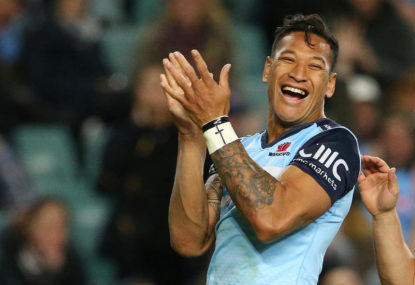The Maori have a poignant saying when a great person dies: “A mighty Totara has fallen in the forest.”
Over the past years, a number of the greatest heroes Australian rugby has produced have passed away. As each one of these mighty Totara falls, an era passes away with them, hopefully not into oblivion but into the blessed memory of rugby lovers.
We need their memory to remain part of the lore of Australian for they were men who put the running, the courage, the joy of playing and an unbridled love of the rugby game into every aspect of their lives. They lived rugby, on and off the field.
There is a fear, at least from old-timers like myself, that with the passing of these old heroes something essential in the success of Australian rugby will go with them.
These were not players, for instance, who regarded playing as a “tough day at the office.” They played and later became coaches and administrators, as the title of Simon Poidevin’s fine rugbiography, For Love, Not Money, suggested.
My fear is that right now, with some exceptions, players and administrators have become totally obsessed with the money professional rugby is generating. For the most part, especially with the players and coaches, it is money rather than love that drives their rugby ambitions.
My hunch, too, is that this decline in the passion for the game by the professional players is being reflected in the poor results being recorded on the field in recent times.
[latest_videos_strip category=”rugby” name=”Rugby”]
Remember this. The last generation of players who were schooled in the amateur game (playing for love, not money) ended their careers around the 1999-2002 era. This is the last time the Wallabies were the best team in world rugby and, more importantly, when Australian rugby players, coaches and administrators led the charge to modernise the game and make it more accessible to players around the world.
Last week, Sir Nicholas Shehadie passed away. Nick, as he insisted on being called, was only one of two Wallabies to be knighted. Sir Ernest Edward ‘Weary’ Dunlop, another old hero on and off the field, a champion who was buried in his Wallaby jersey, is the other.
A superb biographical essay has been written about Nick by Rodney Cavalier, ‘Redfern boy who had Sydney sport in his blood‘. Cavalier knew the great Shehadie through their mutual experience of serving on the famed SCG Trust boards and his account of his friend’s life is memorable, one of the great, insightful essays to be written by an Australian anywhere this year, or any other year.
If you want to understand how the power of love for a great game can create greatness in a man, with rugby taking a ‘central position’ in his life, read Rod Cavalier’s essay/obituary on Nick Shehadie. It is masterly.
The essay in graphic detail and deep understanding underlines how Nick Shehadie “lived a good life. The friends he made were friends for life. He had no false airs … Essentially unchanged, he was a kid from Redfern, the child of migrants, who married brilliantly, created his own family, soared to the heights and shed no one along the way. Nick was the best of Sydney and Australia.”
What a tribute. And what a deserved tribute.
Last December, Ken Catchpole, arguably the greatest halfback of all time, died. He joined others in the roll-call of old heroes, Terry Curley, David Brockhoff, and Trevor Allan, who have passed away in the past years.
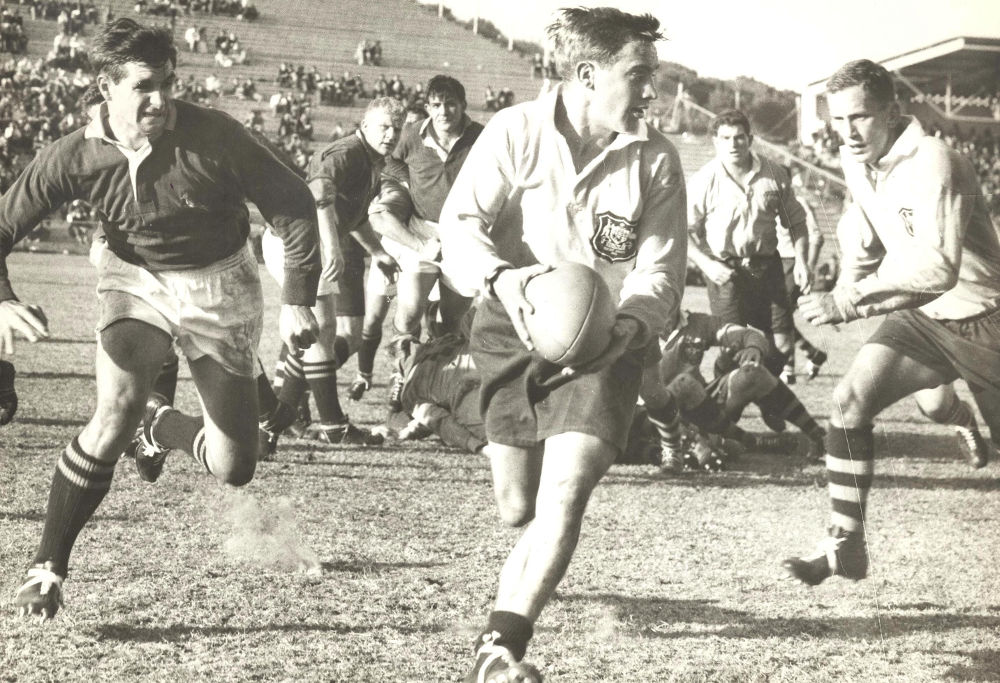
(Rugby Australia)
To a greater of lesser degree, I knew these old heroes. I met Nick Shehadie in a pub in Mosman with a group of good old rugby boys that David Brockhoff organised every month or so.
With Ken Catchpole, it was after a Bledisloe Cup Test at Homebush when we both were waiting in a massive queue, around midnight, to catch the train back into Sydney.
Trevor Allan was a hero of mine from the time I saw him captain the Wallabies to defeat the All Blacks at Athletic Park, Wellington, in 1949. Although I was a tiny halfback for the convent school team, I experimented with wearing headgear (which was his trademark) to honour his memory. When I met him much later at a rugby function in Sydney it was as if (at least for me) we had been friends all our lives.
What I had in common with these great Australian rugby heroes was an enduring passion for the rugby game. I found that even though I was a New Zealander writing about rugby for the Sydney Morning Herald and The Roar, they confided in me, told me things that informed my articles and welcomed any insights I might have to offer to deepen their understanding of what was happening.
I also found that in many instances I appreciated their careers in rugby, on and off the field, more keenly than the current generation of Australian players and administrators have done. And just on this point, I was interested that the only words honouring Nick Shehadie I read from a contemporary rugby player came from Sonny Bill Williams, from the Blues training camp in Auckland.
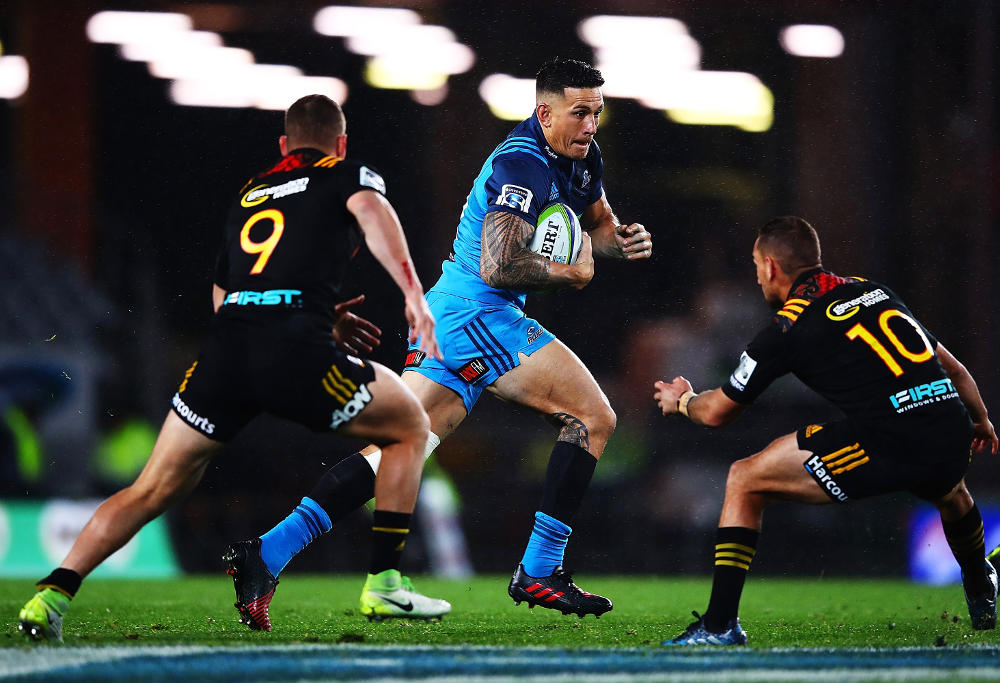
(Photo by Hannah Peters/Getty Images)
This is just one instance, it seems to me, one of many, where the professional rugby game in Australia seems to have blotted out the memories and the knowledge of the amateur era.
Here is another instance. During the Chris Hickie era of boring and unsuccessful Waratahs rugby, a meeting (actually a confrontation) of the players and coaches and disgruntled fans was arranged.
At the meeting, a stocky, white-haired man with an air of authority about him and deep knowledge of rugby practice and theory spoke passionately about the woes of the Waratahs on several occasions. He talked about the Waratahs ethic of running the ball and how it had been traduced under the current coaching and playing regime.
His interventions, although warmly received by the Waratahs supporters in the audience (correctly so), were barely tolerated by the panel of Waratahs coaches and players. There was a general air of resignation about their attitude to the cogent arguments being presented to them.
After the meeting, I caught up with the white-haired man, Terry Curley, one the great men in the history of Australian rugby and someone, now a friend, who had contacted me years earlier to discuss what was going on in Australian rugby. And what could be done about it.
Terry had driven from the South Coast and was facing a long drive home. Despite this, we chatted for some time about what we had just experienced. He insisted that I continue the campaign I was running in the SMH (with Greg Growden) to get the Waratahs to play their traditional running rugby.
For those who have never heard of Terry, this is what the Times wrote about his play during the 1957 Wallabies tour of the UK: “There was a stamp of greatness about the 19-year-old fullback, Terry Curley. His incisive break-through, his coolness under pressure, his safe handling, his positional play and his courage in checking the rolling ball were characteristic of his exhilarating displays.”
This was the rugby man no one in the Waratahs camp had any knowledge of.
This disregard for the history of rugby in Australia and to the Waratahs ethic of running the ball was exemplified when the Waratahs played the Rebels at Melbourne, in their first home match in Super Rugby. Melbourne sports writers, especially those involved with the AFL, wanted the match to be a failure in terms of crowd appeal.
And, unfortunately, the Waratahs fulfilled their wishes. In the last ten minutes of the match, even though they were leading by a comfortable margin of points, the Waratahs put down a series of scrums in front of the Rebels posts and ground down the minutes until the game ended. The crowd was bored witless. The AFL reporters had a field day bashing the rugby game.
When I think of the rejection of Terry Curley by coaches who should have known better, I also think of the generations of great players from the amateur era who have been virtually ignored by the players and coaches who have dominated the professional era.
We have Glen Ella, for instance, coaching the England backs. Why isn’t he on the Wallabies coaching staff? And what use, either in coaching or administration, has been made of the charismatic Mark Ella?
David Campese is now back living in Sydney. Will the Waratahs or the Wallabies use his vast knowledge of back play to improve the attacking play of these sides?
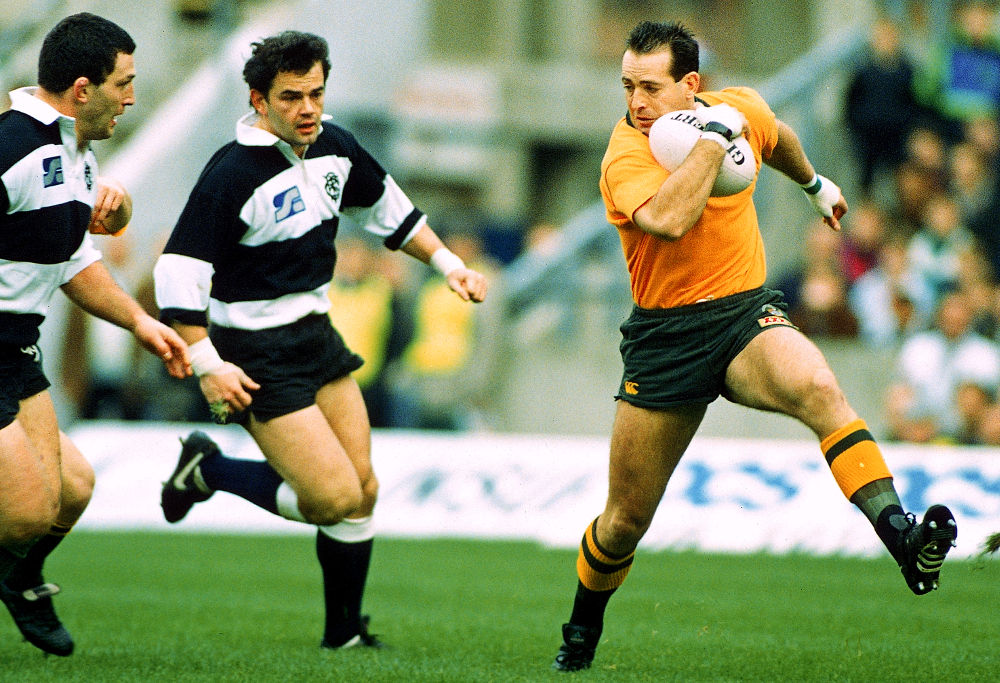
(Photo by Getty Images)
Bob Dwyer and Dick Marks, two champion coaches and in the case of Marks an outstanding centre for the Wallabies in the amateur era, have been involved with the ARU in setting a coaching regime to equal that in New Zealand. I have heard reports that nothing is being done about the actual implementation and writing of the scheme. What is happening here?
Memo 1 to Raelene Castle, the new CEO of Rugby Australia: The way to revive Australian rugby and bring back the triumphs of the 1999–2001 era, when every trophy worth winning was won, including the Bledisloe Cup, is to invest in club and school rugby, the heartland of the game that has been neglected in the past few years. And to exploit the coaching talent of those who learnt and played their rugby in the amateur era.
It seems to me, looking back over the professional era of rugby that started in 1996, that in Australia, particularly, a group of new professionals have seized the money-generating parts of the game as players and coaches and have rewarded themselves and their mates in the process.
There have been too many selections of players and coaches based on a ‘job for the boys’ mentality. This has created a wide-spread disenchantment among the rugby public and a culture of back-stabbing and division in the ruling elite of the game.
The outgoing chairman of the ARLC, John Grant, summed up the culture of rugby league in Australia this way in his last financial report: “There is a culture of self-interest, divisiveness and negativity that seems to be ever present.”
This summary, with its emphasis on factionalism and self-interest, could be applied just as easily to the rugby game in Australia.
Memo 2 to Raelene Castle: introduce a register of managers/agents of all the professional coaches and players in Australia. This will introduce some needed transparency in the movement of players and coaches among the franchises.
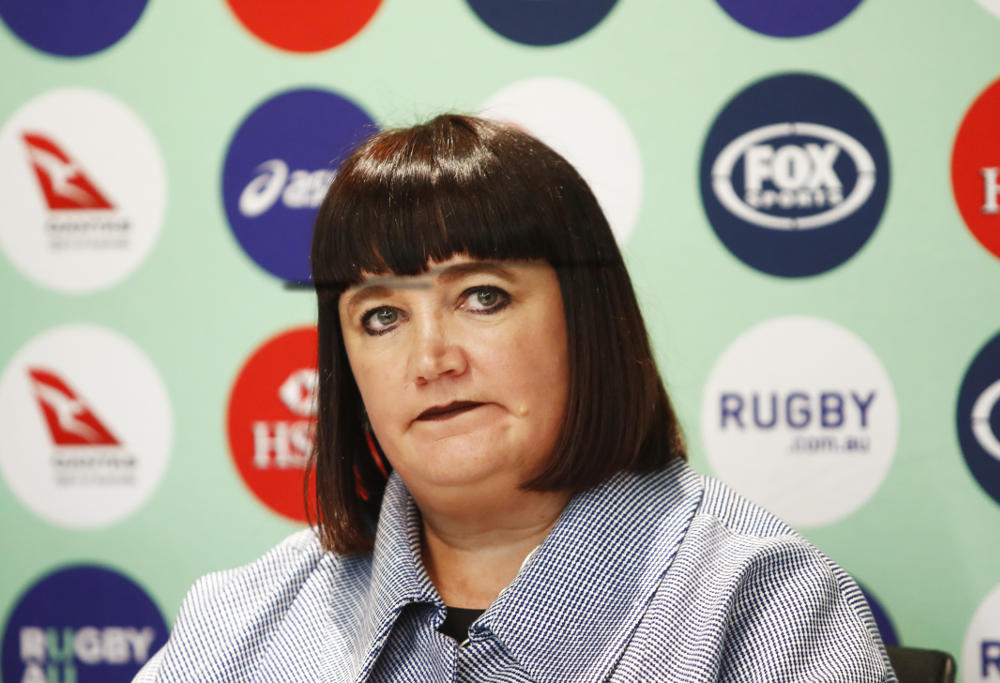
(AAP Image/Daniel Munoz)
Memo 3 to Raelene Castle: never ever agree to another contract like the one-sided, massively expensive deal that the ARU signed with David Pocock to pay him a huge amount of money not to play for the Wallabies in 2017, but allow him to play for the Japanese Top League club Panasonic Wild Knights.
Pocock has come back from his Japanese stint with a dicey knee that needs to have an operation. He will be out of Super Rugby for about 12 weeks.
I know that David Pocock is a revered figure in Australian rugby but the contract he signed with the ARU was all about money. As simple and as obvious as that.
As Peter FitzSimons has written in the Herald: “Can I ask the obvious? If you are going to pay your finest footballer full-freight to take a break and freshen up, to effectively be paying him to rest, why would you allow him to pick up extra coin by playing a torrid season overseas, just before he gets back to you. What am I missing?”
Right on, Fitzy.
All is not lost, though, in the current generation of players. Stand up and take a bow, Israel Folau.
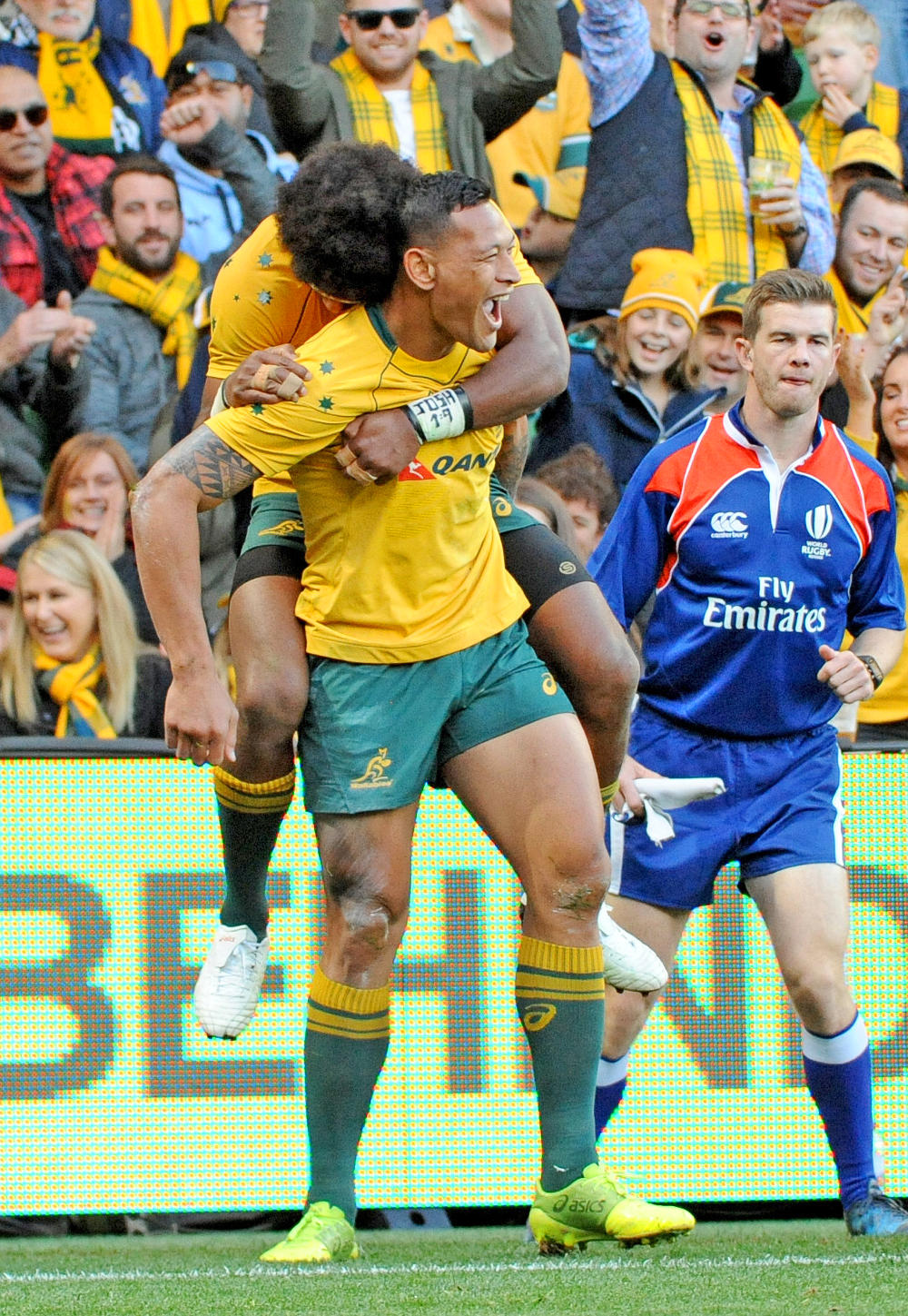
(AAP Image/Joe Castro)
Israel Folau was allowed by the ARU to miss the Wallabies tour of Europe. In his four months of time off, he gave up the opportunity to play in Japan. He has married. He has rested from playing and he has trained. And he has discovered a love for the rugby game that his great predecessors playing for the Wallabies who have passed away in recent years would have been proud to share with him.
Talking to the SMH’s Georgina Robinson, Folau revealed that his involvement with the Waratahs and the Wallabies has changed his attitude from his childhood days when rugby league was the code he loved.
“It does surprise me. When I first came to rugby I signed a one-year deal, not thinking about the long term, but coming to try to make the most of the opportunity … I certainly didn’t think I’d be five years deep into playing the game but it’s something I enjoy and really love. Now I’m looking to try to improve, get better as a player.”
Over the weekend, playing at home, the Stormers 28 (three tries) defeated the Jaguares 20 (three tries) in the opening match of Super Rugby 2018.
Next weekend at Allianz Stadium, the Waratahs, coming off a disastrous season in which they won only four matches, play the Stormers.
I’m expecting a revitalised home side, with Israel Folau leading the charge, will play with the enterprise, passion and skill of the old heroes of Australian rugby to start their 2018 Super Rugby campaign with spirited victory.





























































































